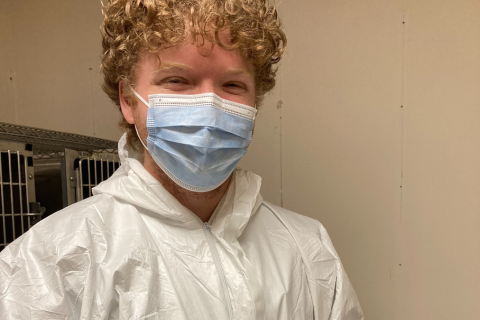Resources for International Students
The Career Center helps international students with all aspects of career development, from career exploration, resume and cover letter writing, to internship and job searching, and more. If you’re planning to search for jobs in the United States, be sure that you understand the requirements for students on F-1 and J-1 visas. Visit the Tufts International Student Center for more information, as changes to these guidelines can occur.
Check out Interstride, a tool to enhance the career exploration and job search experience for international students. Along with job listings, real-time hiring trends, employer information, and tailored assessment tests, the portal offers guidance on overcoming cultural differences, becoming a better networker, and making the most out of the international experience. Alumni: When asked for “university email” on the log in page, please use an active email address (personal or work). You will be asked to provide information which will be forwarded to the Tufts Career Center for approval.
The Herd is our flash mentoring platform for student-alumni career conversations. In addition to talking with alumni whose career paths interest you, we encourage you to join our new affinity groups on The Herd, which encourage productive interaction and networking through professional and social engagement, provide opportunities such as jobs, internships, volunteer roles, and events, and support the community’s professional and career development through advocacy.
Join the Global Jumbos Network
Support for Your Career Development
-
Visa Tips
- Working in the USA – Overview of how students with an F-1 visa can work in the US during college and after graduation (click around the site for a variety of other topics)
- My Visa Jobs Blog – Tips and articles on H1B Visa applications
- Visa Coach – Top 100 H1B US Visa Employers from recent years
- US Department of Homeland Security – Guidelines for F-1 students looking to intern at an international organization
- Foreign Labor Certification Data Center – Search for specific companies and obtain lists of companies that have sponsored H1B visas in the past
-
Job and Internship Search Listings and Advice
- One Day One Job Blog – Job search tips for international students; additional job search tips and articles available here
- iHipo – International job and internship database
- International Careers Consortium (ICC) – Annual conferences in the Boston area for American students considering international careers and international students looking to work in the US or in countries other than their own
-
Communication Skills Training
- Tufts StAAR Center – Individualized writing assistance for current students
- Tufts International Programs and Partnerships – Summer ESL institutes and individualized programs
- Tufts Editorial Style Guide – Quick tips for correct punctuation
- Purdue University Online Writing Lab – Grammar, usage and cultural considerations for ESL writers
- EnglishClub – Lessons, games and quizzes for ESL learners
- Dictionarist – Online dictionary that provides pronunciation examples
Quick Tips for Applications
-
Prepare your personal marketing materials
Review Resume and Cover Letter information for formatting and content guidance specific to U.S. employers. For the resume, you may notice some differences between your country of origin and U.S. standards. For instance:
- U.S. employers prefer single-page resumes (and cover letters) vs. multi-page documents
- In the U.S., resumes do not include personal photo or mention of age, gender, marital status or home country
- U.S. resumes provide little or no information about high school, especially for junior/senior resumes
- In the U.S., the term “CV” refers to a longer document used by researchers and academics
-
Be aware of what U.S. employers may not knowFor example, a U.S. employer may not know that a certain company is the top biotech firm in India or that your school was one of the top five universities in Japan. Be sure to provide this context in your resume.
-
Know when to address your visa status
Talk to a career advisor if you have questions about how or when to address your visa status with employers.
Here are a few tips:
- Don’t mention your status in a resume or cover letter unless you are asked to specify.
- When an interviewer asks if you’re eligible to work in the U.S., you should answer that you can work in the U.S. on Optional Practical Training (OPT) for the duration of your OPT, after which point you would need to be sponsored.
- Do not wait until the second or third interview to discuss sponsorship.
-
Take advantage of networking resourcesNetworking is important. In particular, talk to other international students and international alumni to see how they handled the job search process.
Quick Tips for Interviewing
-
Prepare and practiceReview our interviewing information and practice answers to sample questions out loud, in the mirror, with friends or family and with a career advisor.
-
Enhance your communication skills
- Talk in class; give presentations
- Join conversation groups; participate in clubs
- Take communication and public speaking classes
- Watch American TV, listen to the radio, read newspapers and academic publications
-
Understand and prepare for cultural differences
Interviewing standards and expectations are different in the U.S. than in other countries.
U.S. employers:
- Expect that the interview is your chance to sell yourself as you answer their questions.
- Value candidates who can express how they made a difference through their accomplishments or by overcoming obstacles.
- May start with direct questions. Some small talk might be appropriate, but not for very long. Be ready to get down to business pretty quickly.
- Expect that you will research the organization and demonstrate that knowledge during the interview.
-
Know which questions are illegal for U.S. employers to ask
- How old are you?
- Are you married?
- Are you a US citizen?
- How many children do you have?
- What is your religion?
- Where were you born?
*If these questions do come up, we encourage you to see a Career Advisor for help.


















